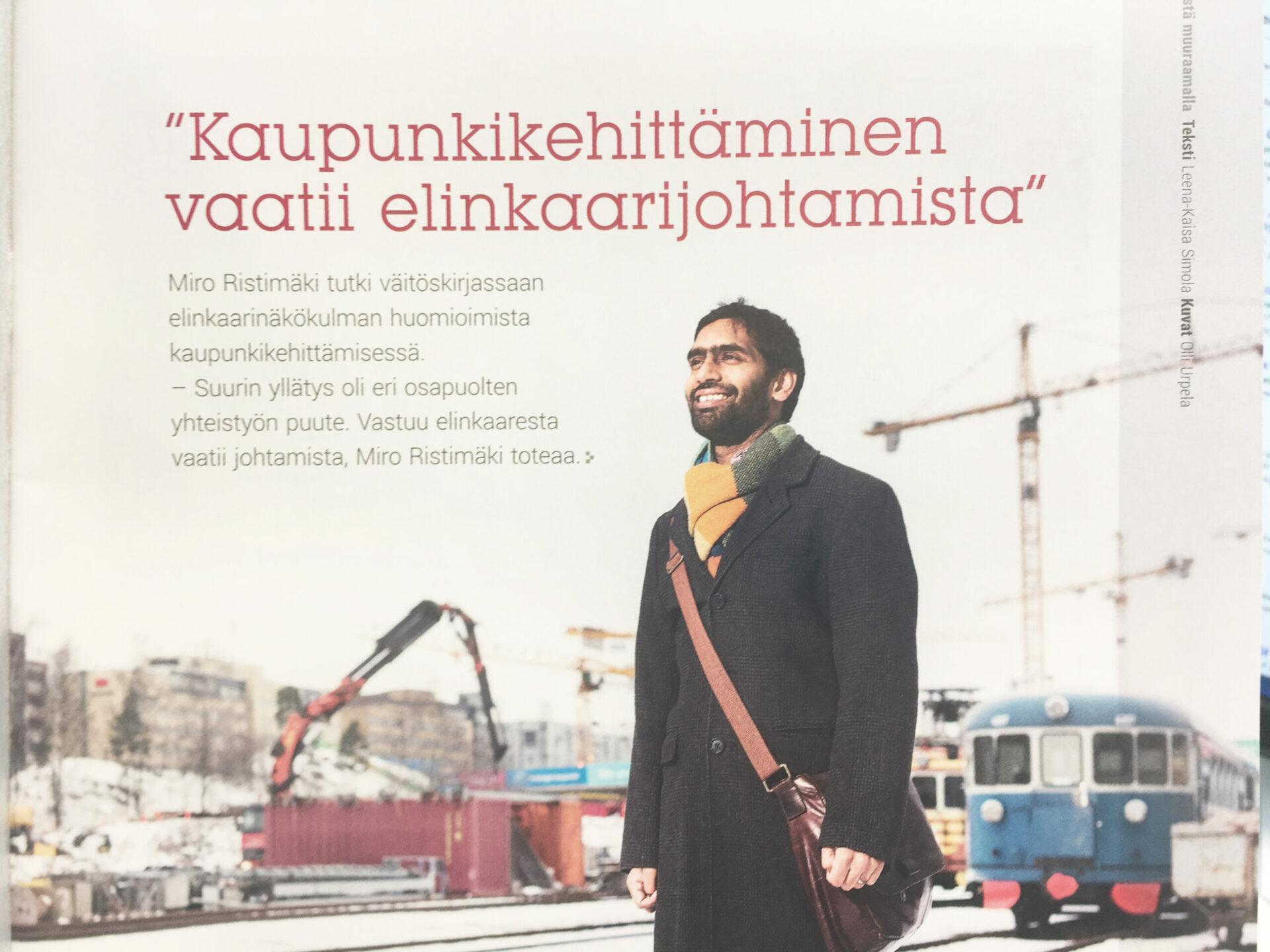Miro Ristimäki´s doctoral dissertation examined the view of the lifecycle perspective in city development.
– The biggest surprise was the lack of cooperation between the various parties. Responsibility of lifecycle requires leadership, says Ristimäki.
Ristimäki works as a project manager at Boost Brothers Oy. The company provides services for construction and business management.
– We want to change the construction industry, Ristimäki sums up.
Previously Ristimäki has worked in major construction companies where lifecycle projects have become very familiar.
– I noticed that lifecycle projects were part-optimized between design, construction and maintenance. Nobody was watching over the outcome. I decided that the situation must be improved.
This led into Ristimäki´s dissertation, and as a result of his research he created a new term: lifecycle management. Lifecycle management helps to increase the lifecycle responsibility and to achieve the jointly set lifecycle targets. Practical benefit for operators in the built environment is the value of sustainable development brought by lifecycle management.
Responsibility perspective
According to Ristimäki, lifecycle management starts from the responsibility point of view.
– In area of urban development, different business models do not support each other. Everyone focuses to think about the pie, and their piece of it. Instead they should be thinking about how to make the pie – as big as possible – together.
Ristimäki thinks that the public and private sectors are too far apart.
– For example, in planning, nobody really knows who is responsible for the outcome and lifecycle. Private investors have different interests than planning architects, who do not necessarily have the best understanding of the costs. There is a lot of talk about partnership planning which is a good thing. It would be productive to find a common language between urban and commercial models.
According to Ristimäki, building projects have goals for both: the investment and the budget for the building time-period. The economic, ecological and social impacts of the lifecycle yet still remains underestimated. And therefore Ristimäki questions the responsibility of real estate business.
– The common agenda of the various parties has no lifecycle goals. Decision-making lacks a long-term strategy. Therefore, a need for lifecycle management exists to ensure the rational and overall economic use of the project throughout its lifecycle.
Impact on climate change
Sustainable urban development provides an excellent opportunity to influence climate change, as urban areas are responsible for most of the energy consumption and environmental impacts.
– Unfortunately, decisions are made on the basis of a yield requirement and not from a climate change point of view. Lifecycle management can show that saving money and resources also saves the environment. Justified decisions are easier to accept.
According to the dissertation, the challenges of urban development combined with intensified urbanization question the current urban development practices from a life-cycle perspective.
– Now in cities and growth centers, have rush to generate more homes. At the same time, we have taken a step backwards in lifecycle thinking. The focus shouldn´t be in today’s situation. It should be a lot further in the future.
– The functions of society are changing and the flexibility of the building stock must also be taken into account in a different way than before.
More value
Miro Ristimäki interviewed nearly 100 people in the field of construction, from land use to investment and construction, for his dissertation.
– Clearly there is a desire for change, but the various parties do not really know how to develop the cooperation.
Ristimäki holds the answer:
– Life-cycle responsibility and management must be demonstrated through market value. The decisions that are now being made will create a value for the project later for both owners, users and other stakeholders. The added value to be gained must also be shared equitably between the parties.
A collaborative model must be created so that all project partners are committed to, as well as simple lifecycle management tools that everyone can use. Tools are needed for determining and measuring life cycle management, among others. Ristimäki highlights, that the construction industry itself must find the created value brought by the lifecycle projects.
– If lifecycle management will be lead politically, the lifecycle is considered only for this reason and the sector gets bureaucratized.
New kind of attitude
Miro Ristimäki does not argue, however, that the construction sector would not cooperate between the various parties.
– This is an attitude question. A lot more should be done. The lack of mutual trust between the participants around the table still exists. Two-thirds of Finland’s national property is real estate and really big and important investments are done in construction. It is almost scary to notice, that the whole lifecycle of these projects is not seriously considered.
– Responsibility belongs to everyone, but the lifecycle model needs a strong leader. When the responsibility is loose in lifecycle-related issues, no one is leading the boat.

